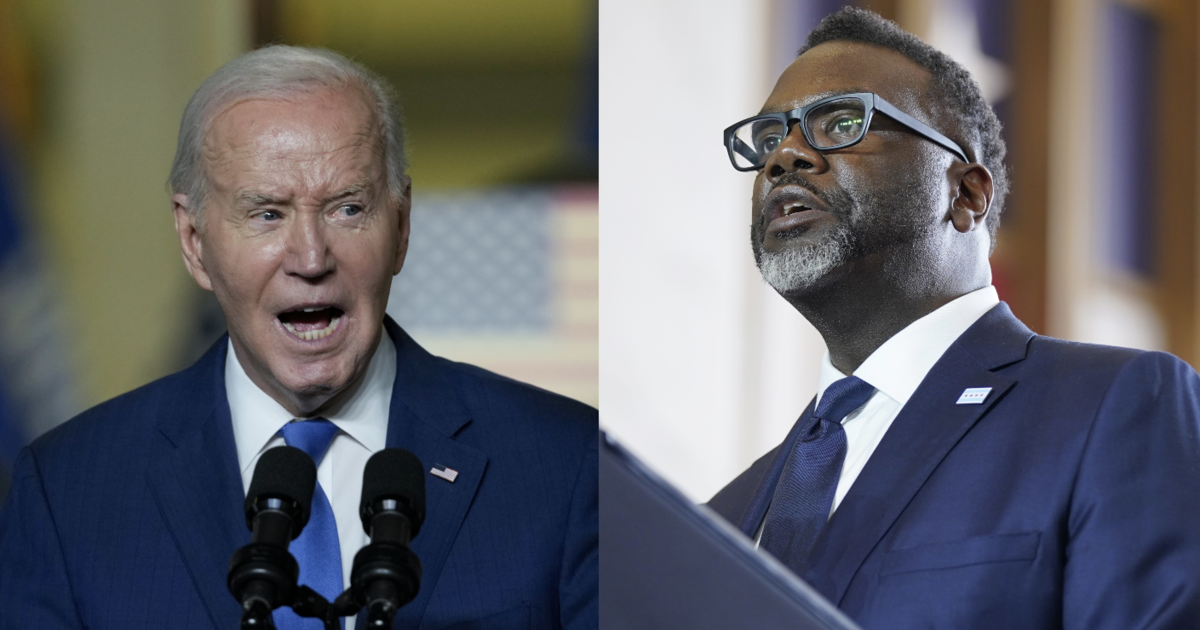Darren Bailey wins GOP nomination for governor in Illinois primary, setting up showdown with Gov. JB Pritzker
CHICAGO (CBS) -- Illinois State Sen. Darren Bailey cruised to victory in the race for the Republican nomination for governor on Tuesday, handily defeating Aurora Mayor Richard Irvin and four other candidates. Irvin had once been the frontrunner thanks to a $50 million infusion of campaign cash from billionaire Ken Griffin.
With 23.5% of the vote counted, CBS News is projecting Bailey as the winner, leading Irvin 49.5% to 17.8%, with venture capitalist Jesse Sullivan in third, at 17.8%, just a few dozen votes behind Irvin.
ILLINOIS PRIMARY ELECTION RESULTS
An ebullient Bailey thanked his supporters Thursday night at a victory rally in Effingham, about 30 miles north of his home in Xenia.
Bailey said his victory sent "a clear message to the establishment and the political elites: we will not be ignored."
"Your voices were finally heard. The voices of working families, parents, taxpayers, law enforcement, and everyday citizens. Voices from the farms, the suburbs, the city of Chicago, and every place in between," he said.
Indeed, Bailey is winning in virtually every county in Illinois, as well as in the city of Chicago, where he got 45% of the Republican vote, with approximately 84% of the vote counted.
However, while praising Chicago in victory, during the campaign, he called the city a "hellhole," and during his time as a state senator, supported a resolution calling on Chicago to be separated from the rest of Illinois.
Bailey said it will be his goal to "Fire Pritzker" in November, blasting the incumbent's stance on taxes, law enforcement, abortion, and more.
Bailey is a staunch abortion opponent who gained statewide notoriety by opposing restrictions Pritzker put in place during the COVID-19 pandemic, filing lawsuits that ultimately failed to curb Pritzker's emergency powers.
Bailey's victory brings an end to a race that was essentially a battle between three billionaires – with Griffin, a longtime critic of Democratic incumbent JB Pritzker, bankrolling Irvin's campaign; shipping magnate Richard Uihlein giving more than $17 million combined to Bailey and a political action committee backing the state senator; and Pritzker, an heir to the Hyatt Hotels fortune, wading into the Republican contest with ads attacking both Irvin and Bailey.
Irvin was upbeat in conceding defeat to Bailey on Tuesday evening.
"In this race for governor, we may not have reached our goals tonight, but we are victorious for daring to step into the arena," he said. "We dared to step into the arena. We forced the issues we care about to the forefront in this November election."
"I'm a winner just by being a strong competitor for governor of the great state of Illinois," he added.
Pritzker, meantime, was confident he'll go on to defeat Bailey in November.
"I'm going to beat Donald Trump's candidate for governor," he said.
The governor hailed a number of accomplishments from his first term, including legislation gradually raising the state's minimum wage to $15 an hour by 2025; boosting funding for K-12 schools across the state; passage of a $45 billion capital plan, the state's first infrastructure construction plan in nearly a decade; replenishing the state's rainy day fund with $1 billion; improving the state's credit ratings; and more.
While Irvin took an early lead in polls earlier this year in the race to face Pritzker in November, Bailey surged in the campaign's final months, taking a double-digit lead over Irvin in recent weeks, culminating with an endorsement from former President Donald Trump on Saturday at a rally near Quincy. That support could hamper Bailey in the general election, as Illinois voters rejected Trump by double digits in 2016 and 2020.
Griffin's $50 million in donations to Irvin's campaign couldn't stop the Aurora mayor's campaign from going into a freefall in recent weeks, under assault from all sides with attack ads funded by Pritzker, the Democratic Governors' Association, Bailey, and others, all essentially portraying Irvin as a lifelong Democrat posing as a Republican.
Former Illinois Republican Party Chair Pat Brady said Tuesday evening that Irvin's gubernatorial campaign was handled poorly. Brady said Illinois GOP powerbrokers "wholesale adopted" Irvin – and consultants "shoved (Irvin) down Republicans' throats."
"They just picked this guy, anointed him, and everybody was supposed to buy into it," he said.
Brady characterized Irvin as "a guy that consultants could control," and indeed, Irvin never stepped out of line from what consultants expected – and even changed many of his positions compared with when he was mayor.
"This was the biggest political debacle, the biggest waste of money, I've ever seen," Brady said. "It was all consultant-driven."
Nonetheless, Irvin was upbeat in conceding to Bailey, quoting former President Theodore Roosevelt:
"It is not the critic who counts, not the man who points out how the strong man stumbles, but where the doer of deeds could have done them better. The credit belongs to the man who is actually in the arena, whose face is marred by dirt and soot and blood, who strives valiantly, who errs, who comes short again and again, because there is no effort with out error and shortcoming," he said.
Meantime, the race for the Republican nomination for governor could also determine the party's future in Illinois, and whether it will swing further to the right of the political spectrum as many other state GOPs have done since former President Donald Trump has essentially taken control of the national party.
All six candidates have said that, to one degree or another, they oppose abortion, tougher gun laws, COVID-19 restrictions, and restrictions on local law enforcement cooperation with federal immigration authorities.
However, in the closing weeks of the primary, the campaign essentially became a two-man race between Bailey, an ultra-conservative state lawmaker from downstate Xenia, who first gained political prominence in Illinois by opposing Pritzker's COVID-19 restrictions, and Irvin, a more moderate Republican who had frequently praised the Democratic incumbent before entering the race.
Bailey's was helped by millions of dollars in ads from Pritzker and the Democratic Governors Association, which have backhandedly called Bailey "too conservative for Illinois," in a not-so-subtle effort to hamstring Irvin in the primary.
Meantime, Irvin has argued Bailey can't beat Pritzker in the general election, saying a vote for Bailey is essentially a vote for Pritzker.
For his part, Bailey has painted Irvin as a RINO, or Republican-in-name-only, noting that Irvin pulled Democratic ballots in statewide primary elections in 2014, 2016, and 2020, as well as in local primary elections in 2017 and 2021. Bailey also pulled a Democratic ballot in the 2008 primary, although he has said he did so to vote against Hillary Clinton for president as part of an effort spearheaded by conservative radio host Rush Limbaugh.
Irvin has repeatedly refused to say if he voted for former President Donald Trump in 2020, while Bailey was a Trump delegate at the Republican National Convention that year.
It's not the only issue where Irvin has been cagey. He has largely avoided taking questions from reporters during his campaign, holding only a handful of press conferences since entering the race, while largely dodging questions about his record, including whether he supports an expected U.S. Supreme Court ruling that would overturn the landmark Roe v. Wade decision, which enshrines a woman's right to an abortion.
During his campaign, Irvin has repeatedly criticized Pritzker's record, even though as mayor of Aurora, he has lauded Pritzker's handling of the pandemic and the economy, and praised him as "a great friend, a great leader who has guided our state with professionalism" during a vaccination event in Aurora in March 2021.
Pritzker has highlighted those consistencies in a campaign ad, which points out how Irvin has praised the governor's policies in the past, and has asked, "why is he even running?"
And Pritzker has rejected Irvin's claims that a vote for Bailey is the same as voting for his own re-election.
"It's a ridiculous statement, the idea of equating the most conservative person on the Republican side with me. I'm a Democrat. I believe in the values of the Democratic Party," Pritzker told reporters earlier this month.
Then, just days before the election, Griffin announced he was moving his Chicago-based hedge fund, Citadel, to Miami. Although Griffin's camp has insisted Irvin's faltering campaign had nothing to do with the move, it certainly sent a message to Republican voters that Griffin lacked confidence in Irvin's ability to win.
Whether Griffin decides to throw his money behind Bailey in the general election remains to be seen, but seems a longshot at best with the billionaire moving to Florida.
That would give Pritzker a significant edge in fundraising heading into November against a far-right challenger in a solid blue state.



